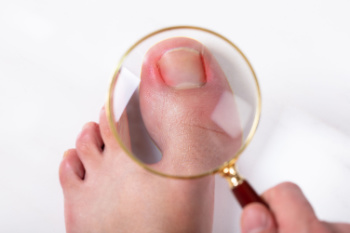 Ingrown toenails occur when the edge of a toenail grows into the surrounding skin, causing pain, swelling, and sometimes infection. Those at higher risk include individuals with curved or thick nails, those who trim their nails improperly, people who wear tight or ill-fitting shoes, and athletes or dancers who frequently stress their feet. Symptoms of ingrown toenails include redness, swelling, pain along the nail edges, and, in severe cases, pus or infection. Common causes are improper nail trimming, trauma to the toenail, and genetic predisposition. To prevent ingrown toenails, trim nails straight across, avoid cutting them too short, and wear shoes that provide adequate space for the toes. Relief for mild cases includes soaking the foot in warm water and keeping the foot clean. If you have severe symptoms of an ingrown toenail or it appears infected, it is strongly suggested that you schedule an appointment with a podiatrist who may prescribe antibiotics or possibly a minor surgical procedure.
Ingrown toenails occur when the edge of a toenail grows into the surrounding skin, causing pain, swelling, and sometimes infection. Those at higher risk include individuals with curved or thick nails, those who trim their nails improperly, people who wear tight or ill-fitting shoes, and athletes or dancers who frequently stress their feet. Symptoms of ingrown toenails include redness, swelling, pain along the nail edges, and, in severe cases, pus or infection. Common causes are improper nail trimming, trauma to the toenail, and genetic predisposition. To prevent ingrown toenails, trim nails straight across, avoid cutting them too short, and wear shoes that provide adequate space for the toes. Relief for mild cases includes soaking the foot in warm water and keeping the foot clean. If you have severe symptoms of an ingrown toenail or it appears infected, it is strongly suggested that you schedule an appointment with a podiatrist who may prescribe antibiotics or possibly a minor surgical procedure.
Ingrown toenails can become painful if they are not treated properly. For more information about ingrown toenails, contact Warren Levy, DPM of Armitage Podiatry Center. Our doctor can provide the care you need to keep you pain-free and on your feet.
Ingrown Toenails
Ingrown toenails occur when a toenail grows sideways into the bed of the nail, causing pain, swelling, and possibly infection.
Causes
- Bacterial infections
- Improper nail cutting such as cutting it too short or not straight across
- Trauma to the toe, such as stubbing, which causes the nail to grow back irregularly
- Ill-fitting shoes that bunch the toes too close together
- Genetic predisposition
Prevention
Because ingrown toenails are not something found outside of shoe-wearing cultures, going barefoot as often as possible will decrease the likeliness of developing ingrown toenails. Wearing proper fitting shoes and using proper cutting techniques will also help decrease your risk of developing ingrown toenails.
Treatment
Ingrown toenails are a very treatable foot condition. In minor cases, soaking the affected area in salt or antibacterial soaps will not only help with the ingrown nail itself, but also help prevent any infections from occurring. In more severe cases, surgery is an option. In either case, speaking to your podiatrist about this condition will help you get a better understanding of specific treatment options that are right for you.
If you have any questions please feel free to contact our office located in Chicago, IL . We offer the newest diagnostic and treatment technologies for all your foot and ankle needs.
